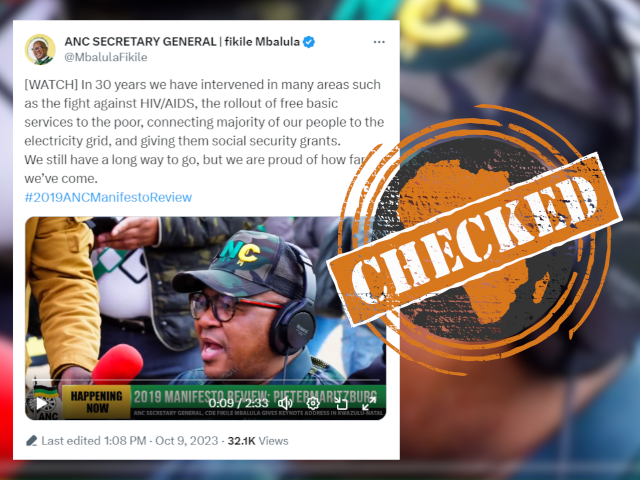IN SHORT: South Africans are alarmed at a video doing the rounds on social media with the claim it shows Mozambicans being “imported” to vote in the country’s May 2024 elections. But Mozambique also goes to the polls in 2024 and the video shows a Mozambican voting registration drive for Mozambicans living within South Africa.
“MOZAMBIQUE CITIZENS IMPORTED FROM THEIR HOMES TO COME AND VOTE FOR ANC IN UPCOMING MAY ELECTIONS,” reads the copied-and-pasted caption for a video going viral on WhatsApp and Facebook in South Africa in April 2024.
It adds: “THEY ARE NOW STATIONED IN GAUTENG and Getting processed to have ‘VOTING CARDS’ ID CARDS BY A HOME AFFAIRS-CONTRACTED ‘AGENT’.”
South Africa is set to vote in national and provincial elections on 29 May. The ballot is likely to be game-changing, as opinion polls suggest the ruling African National Congress (ANC) may lose the parliamentary majority it has held since 1994.
Mozambique borders South Africa to the northeast. Migrants from the country, and elsewhere in Africa, into South Africa have long been targets of anti-migrant sentiment and xenophobic violence. Many migrants come to Gauteng province in the northeastern part of the country and South Africa’s economic centre.
The video begins with the camera operator questioning a man in a blue vest standing in a dusty yard. He asks the man, who he addresses as “commander”, if he is an “agent”. The man shows the insignia on his vest, two logos that spell out “CNE” and “STAE”. He explains that he is registering people for voters’ cards. He speaks a mixture of isiZulu and English.
The camera operator then heads off to a nearby building, muttering: “This is automatically out of order.”
Inside the building we see people in similar blue vests at tables with laptops and other electronic equipment, and a crowd waiting in chairs.
The camera zooms in on a document being printed and then on a man cropping passport photos. The cameraman asks where he is from and he says Maputo, which is the capital of Mozambique.
The claim has been posted on Facebook dozens of times, including here, here, here, here, here, here, here and here. It also appears on X (formerly Twitter) and YouTube.
But does the video really show Mozambicans “imported” into South Africa to “vote for ANC” being “processed” for “voting cards ID cards”?

Voters’ card used in Mozambique, not South Africa
First, South Africa’s voter registration drive ended on 23 February, the day the election date was announced.
Extensive searches, including reverse image searches of frames from the video, could find no online evidence of the footage earlier than 17 April. It would be impossible for the video to show “imported” Mozambicans being “processed” to vote in South Africa’s elections as the voters’ roll was closed almost two months before.
Second, voting in South Africa requires a green barcoded ID book, smart-card ID or temporary ID certificate. The country does not have a separate voters’ card. But Mozambique does.
The CNE and STAE logos on the man in the video’s blue vest belong to Mozambique’s Comissão Nacional de Eleições (Portuguese for national electoral commission) and Secretariado Técnico de Administração Eleitoral (technical secretariat for election management). The STAE is responsible for voter registration under the supervision of the CNE.
Mozambique is set to hold national, provincial and presidential elections on 9 October.
On 30 March, CNE-STAE launched a cross-border voter registration drive with the aim of registering 200,000 Mozambican citizens living in South Africa. The drive focuses on the provinces of Limpopo and Mpumalanga, which border Mozambique, as well as Gauteng.
By 21 April, some 136,000 Mozambicans in South Africa had been registered to vote in their country’s 9 October elections. The process ends on 28 April.
The video shows a CNE-STAE registration station issuing Mozambican voters’ cards to Mozambicans in South Africa.
Plenty more evidence
The video itself offers two more bits of evidence that the claim is false.
The electronic equipment (at the 1:33 minute mark) are mobile voter registration kits supplied to CNE-STAE by the China-based Laxton Group, which specialises in election and identity technology. Photos of the kit can also be seen here and here.
The Laxton kit is not used to register voters for South African elections.
The document being printed (at the 1:45 minute mark) is headed “República de Moçambique, Comissão Nacional de Eleições, Secretariado Técnico de Administração Eleitoral”. It includes the emblem and flag of Mozambique. It is larger but resembles the Mozambican voters’ card.
Even Facebook users spreading the claim admit it is false. One of the earliest instances, posted on 18 April, ends: “I DON'T CAR IF IT'S TO VOTE IN MOZAMBIQUE IN OCTOBER, WHY IS SOUTH AFRICA INVOLVED?”
The process captured on the viral video is to register Mozambicans living in South Africa to vote in Mozambique.
Republish our content for free
For publishers: what to do if your post is rated false
A fact-checker has rated your Facebook or Instagram post as “false”, “altered”, “partly false” or “missing context”. This could have serious consequences. What do you do?
Click on our guide for the steps you should follow.
Publishers guideAfrica Check teams up with Facebook
Africa Check is a partner in Meta's third-party fact-checking programme to help stop the spread of false information on social media.
The content we rate as “false” will be downgraded on Facebook and Instagram. This means fewer people will see it.
You can also help identify false information on Facebook. This guide explains how.





Add new comment